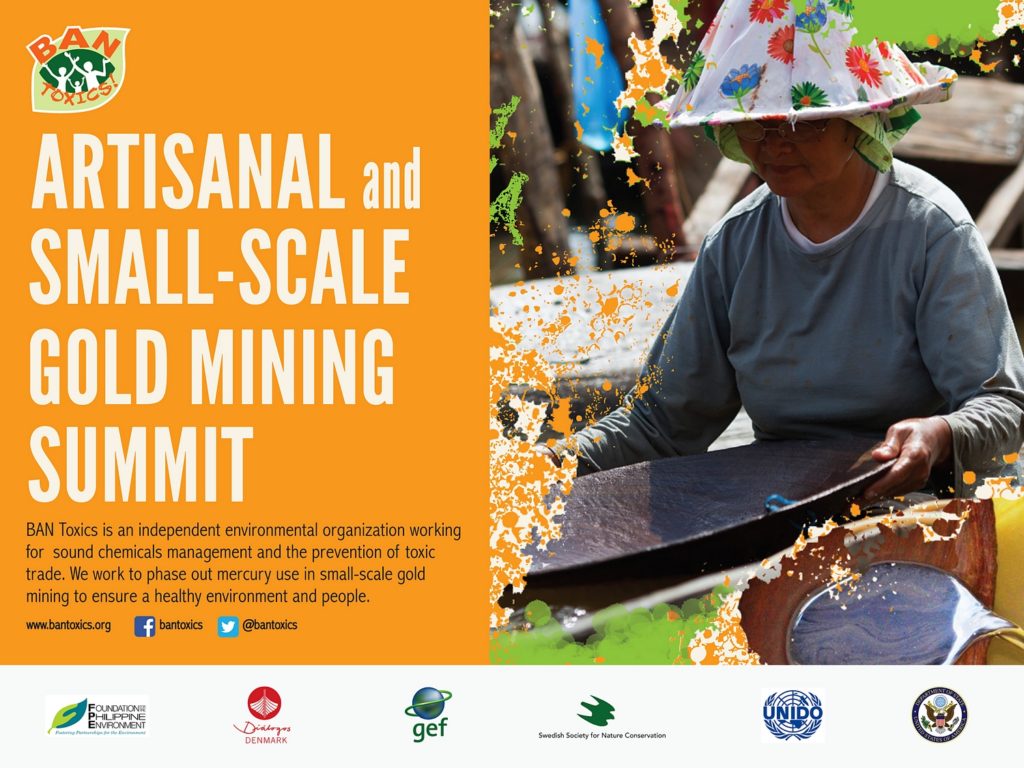
Davao City, 25 April 2016—Responsible, mercury-free gold from the Philippines may soon be available in the international market—potentially changing the lives of around 500,000 Filipino artisanal and small scale gold miners who mostly work in risky and exploitative situations, by helping them lead healthier lives, gain better income and practice safer livelihoods.
The move, the first ever in the country, is being led by environmental NGO BAN Toxics in coordination with the Artisanal Gold Council and various partners[1]. The project, still under development, was announced during the two-day 4th National Artisanal and Small Scale Mining (ASGM) Summit[2] which starts today at the Ateneo de Davao University.
Gold mining has been more a bane than a boon to communities, and is risky and unsustainable for the environment and people.[3] “Wala namang yumaman nang todo sa maliitang pagmimina,” said Charito Elcano, of the Mambulao Small Scale Mining Cooperative, Jose Panganiban, Camarines Norte. “Ang kapalit ng konting kita ay mabigat at mapanganib na trabaho at paglalason ng aming pamilya dahil sa asoge. Hindi namin gustong mabuhay nang ganito sa habang panahon.”[4]
BAN Toxics has been working on the ground with ASGM communities throughout the country to help transform ASGM communities for the benefit of the environment and rural people. Mine-to-market interventions that give a premium for responsible and mercury-free gold can enable a sustainable transition to mercury-free mining and offer the parallel benefits of fair and lawful labor practices as well as equitable sharing of profit.
“The local government of South Cotabato welcomes this development,” said Governor Daisy Avance-Fuentes. “After going mercury-free, this is the next step to uplift the lives of rural communities.”
“Developing mine-to-market supply chains in the Philippines will provide miners and their families with more reliable and fair wages,” said Dr. Kevin Telmer, Executive Director of the Artisanal Gold Council[4]. “For the poor and marginalized communities who rely so heavily on ASGM in the Philippines, this is an exciting step forward.”
With better income, families can find new opportunities for better livelihoods, and enjoy healthier lives with mercury-free methods. New livelihood interventions can also be done to support ASGM communities in the move to better and safer sources of income.
There is a big demand for responsible gold in the European and American markets. Standards setting and certification bodies for responsible gold such as the Responsible Jewelry Council count 700 member companies across the jewelry supply chain. The Artisanal Gold Council has also facilitated a mine-to-market scheme in Burkina Faso, linking small gold miners to the international market. Luxury brands such as Cartier and Tiffany’s state their commitment to sourcing responsible gold in their websites.
Policy support, however, is needed to make the mine-to-market scheme happen. This includes formalization of the ASGM industry, licensing of operators and miners, eliminating child labor, creating spaces for women, financing of advanced mercury-free technologies, mandatory environmental monitoring for mercury in ASGM sites, improving credit access for miners and enhancing entrepreneurial skills for miners and cooperatives through access to technical training. BAN Toxics and small-scale miners are calling on the government and election candidates to champion such policy interventions.
“This move will change the game for small-scale gold mining communities in the country,” said Atty. Richard Gutierrez, BAN Toxics Chief Executive Officer. “It creates not only accountability on the part of small-scale miners to ensure the integrity of their process and product, but and also on government and the gold market to extend fair pricing and benefits due to the small-scale mining community. It’s an en exciting stage, we’re glad Philippine ASGM is poised to engage. We at BAN Toxics are very proud to be part of this change.”
BAN Toxics is an independent non-government environmental organization that works for the advancement of environmental justice, health and sustainable development in the area of chemicals and wastes with a special focus on women, children and other marginalized sectors.
NOTES:
[1] Foundation for the Philippine Environment, the Global Environment Facility, the US Department of State, Dialogos, International Center for Occupational, Environmental and Public Health (ICOEPH), University of Copenhagen, Geological Survey of Denmark and Greenland (GEUS), Swedish Society for Nature Conservation, United Nations Industrial Development Organization
[2] Organized by BAN Toxics every one to two years since 2011, the Summit brings together small-scale miners, representatives from LGUs and national governments, civil society as well as academia and the health sector to discuss progress on efforts to promote mercury-free ASGM.
[3] Unsustainable practices in small-scale mining threaten the environment. With weak enforcement of laws, majority of the operations are illegal and facilities are often substandard. Soil and water contamination exists in these communities. Landslides and floods are also common. The major environmental threats are due to the use of mercury in gold extraction and the eventual environmental degradation caused by the extraction activities and the toxics emissions.
[4] English translation: No one ever got very rich from small-scale mining. All we get is a small profit in exchange for difficult and dangerous work as well as poisoning from mercury. We don’t want to live like this forever.
[5] The Artisanal Gold Council is a not-for-profit organization dedicated to improving the opportunities, environment, and health of the millions of people involved in Artisanal and Small-Scale Gold Mining in the developing world.
